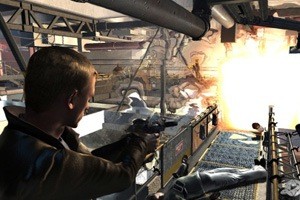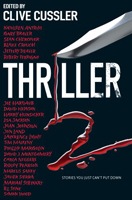Back in 1993, Country singer Toby Keith had a hit with the song “A Little Less Talk and a Lot More Action”. That was a great hook for a song, but the concept doesn’t always work for thrillers. I’ve found that one of the mistakes beginning writers often make is confusing action with suspense; they assume a thriller must be filled with it to create suspense. They load up their stories with endless gun battles, car chases, and daredevil stunts as the heroes are being chased across continents with a relentless batch of baddies hot in pursuit. The result can begin to look like the Perils of Pauline; jumping from one fire to another. What many beginning thriller writers don’t realize is that heavy-handed action usually produces boredom, not thrills.
When there’s too much action, you can wind up with a story that lacks tension and suspense. The reader becomes bored and never really cares about who lives or who wins. If they actually finish the book, it’s probably because they’re trapped on a coast-to-coast flight or inside a vacation hotel room because it’s pouring down rain outside. See John Gilstrap’s I’m Not As Flexible As I Thought.
Too much action becomes even more apparent in the movies. The recent Bond film “Quantum Of Solace” struck me that  way. The story was so buried in action that by the end, I simply didn’t care. All I wanted to happen was for it to be over. Don’t get me wrong, the action sequences were amazing, but special effects and outlandish stunts can only thrill for a short time. They can’t take the place of strong character development, crisp dialogue and clever plotting.
way. The story was so buried in action that by the end, I simply didn’t care. All I wanted to happen was for it to be over. Don’t get me wrong, the action sequences were amazing, but special effects and outlandish stunts can only thrill for a short time. They can’t take the place of strong character development, crisp dialogue and clever plotting.
As far as thrillers are concerned, I’ve found that most action scenes just get in the way of the story. What I enjoy is the anticipation of action and danger, and the threat of something that has not happened yet. When it does happen, the action scene becomes the release valve.
I believe that writing an action scene can be fairly easy. What’s difficult is writing a suspenseful story without having to rely on tons of action. Doing so takes skill. Anyone can write a chase sequence or describe a shoot-out. The trick is to not confuse action with suspense. Guns, fast cars and rollercoaster-like chase scenes are fun, but do they really get the reader’s heart pumping. Or is it the lead-up to the chase, the anticipation of the kill, the breathless suspense of knowing that danger is waiting just around the corner?
What do you think? Is your favorite thriller filled with car chases or is it built on an undercurrent of suspense that’s just waiting to sweep you away? What about your own writing? Do you use a lot of action or is it all cerebral?
~~~~~~~~~~~~~~~~~~~~
 Available today: THRILLER 2, Stories You Just Can’t Put Down.
Available today: THRILLER 2, Stories You Just Can’t Put Down.
~~~~~~~~~~~~~~~~~~~~
Coming up on our Kill Zone Guest Sundays, watch for blogs from Sandra Brown, Steve Berry, Robert Liparulo, Thomas B. Sawyer, Paul Kemprecos, Linda Fairstein, Julie Kramer, Grant Blackwood, and more.

You just nailed why I stopped watching 24. In my opinion, that’s the perfect example of what you speak of. In whatever season it was, they would have had a taut, exciting story had the entire 24 hours concentrated on the Secretary of whatever being kidnapped and executed online. I think they wasted an incredible story line by moving away from that.
You hit on the key, Joe. The reader has to care who “lives or wins” before the action will have any purchase. Who gets it right? Hitchcock, of course. North by Northwest is one long chase. But this includes great character work, starting in the first few minutes with the “innocent man” wrongly caught up in the intrigue. Then the various chase sequences have us caring what happens.
The Fugitive is like that, too. Innocent man. And in between the chases, you have deepening characters, esp. Sam Gerard, and a “pet the dog” beat (Kimble helping the kid in the hospital) that makes us care all the more.
There’s a story I heard somewhere about a writer describing the opening of his script, with a long chase, ending with a car going over a cliff. The producer took the cigar out of his mouth and said, “But who’s in the car?”
You’re right, Chris. I’m a big 24 fan, but they truly need to find a new direction. It’s a case of going to the well one too many times. Still, Jack is the man in my book.
Jim, you picked two great action films that work because of strong characters. And one of my all-time favorite lines is from THE FUGITIVE in the drainage tunnel when Gerard utters, “I don’t care.” Back when I had a real job, the IT manager would come to me to explain why there was a problem with our network or why something crashed. After he had gone on for a few moments with encoded geek-talk, rather than saying “I don’t care”, I would just ask him if he ever saw THE FUGITIVE. That would always end the conversation.
This is why I so rarely read what I call apocalyptic action thrillers. I like action as much as the next guy–unless maybe the next guy is John Woo–but pacing and thrifty use of action makes what’s left that much more effective.
Definitely something to watch for. I was very guilty of that on my first work, but didn’t realize it until reading back over it a year later and finding myself getting bored with the action.
By the way Joe, I am an IT manager and so I know exactly what it means to see people’s eyes glaze over as I speak. Therefore I now add an element of thrillers by gritting my teeth, speaking in a growly voice and staring into their eyes with a well practiced psychotic glimmer.
Whenever someone comes to my office uninvited I quickly slam something shut as if hiding whatever it is I am doing, then act like nothing is going on. Having one of those Frankenstein electrical arcing thingies running in the back ground helps too.
See, no actual action, just suspense building up to action.
Hmm…a cop is standing in the hall outside my office with the mental health doc…wonder what that’s all about?
Hmmm, I do like the action, especially in my own scribblings, but I can sympathize with this position. Especially if the action becomes the end rather than the means. There is a particular author I’m thinking of whose novels are characterized by over-the-top, physical-law-violating actions, so much so that you start to roll your eyes when you see the set-up for the next impossible stunt looming on the horizon. The entire novel becomes one set-up after another. So yes, there is a point of diminishing returns on action.
On the other hand, I think the same might be said for the “thrills.” Let’s face it, there’s nothing new under the sun. We who read this genre have seen the world threatened (and perhaps even destroyed) in nearly every conceivable way.
Ultimately, it’s all going to come down to finding that flavor we enjoy and sticking to it, which is why an author should concentrate on what works best for them instead of trying to please everyone. As Kurt Vonnegut said: “Write to please just one person. If you open a window and make love to the world, so to speak, your story will get pneumonia.”
Basil, you’re “slamming something closed” trick is one I’ll pass on to my IT friend. Normally, he just keeps stacks of burn circuit boards around so the odor will keep people out of his office.
Good observations, Sean. I too am a big fan of action-adventure books and grew up on the likes of Verne and Burroughs, and later Cusser and Clancy. My main protagonist has also saved the world–four times! But we still have to want the world to be saved and must pull for the character doing the saving. Like you said, it’s what works for each of us. BTW, good luck with THE SHROUD OF HEAVEN. We’ll be featuring your interview with Mark Combes in the June Big Thrill.
I have to confess, I loved Quantum of Solace. But I stopped watching 24. (I guess I’m a born Bond fan.) But I think you’re right. We have to care what happens in the action, and action isn’t what’s going to make us care.
Well, as you know, Joe, my own books are action-packed. But I think there are two keys to making it work. First, you have to give a damn about the hero. And second, you have to give a damn about the victims, however you might handle that.
I know that I’m currently working on an SF novel–a real change of pace for me–and I’m antsy at times because there’s not that much action, although it’s interspersed. Yet I think it’s working because it’s clear I’m setting up the three main characters in an increasingly tense set of situations where something bad is likely to happen … and they know it and perhaps are unable to stop it from happening.
So hopefully it’s not about action, it’s about suspense.
Mark, your previous work had plenty of action, but it also showed strong character development. I have no doubt you’ll pull off your new one just fine. And congrats on taking on a new genre. I look forward to reading it.
I’m not an author (though I do write articles, etc.), but the question intrigues me. I think some of the most thrilling, suspenseful books I know take their suspense from the careful building, not from the action scenes. I think the books by Joy Fielding are like that — she’s a master at psychological suspense. (Which reminds me, I shoul check and see if she has anything coming out this summer!) At the same time, sometimes the chase, or the race, or whatever is well-done and really adds to your enjoyment of the book. There’s a book out now about a civilian test pilot
(post WWII), “His Edge,” and the writing of the escapes in the air are integral to the book. They’re very suspenseful, and part of what makes the book a page-turner.